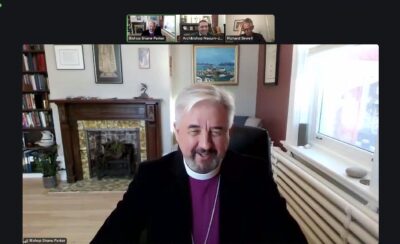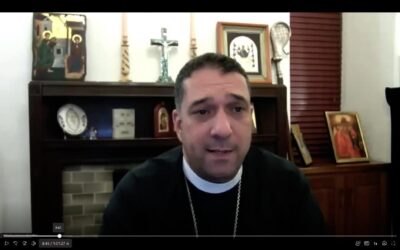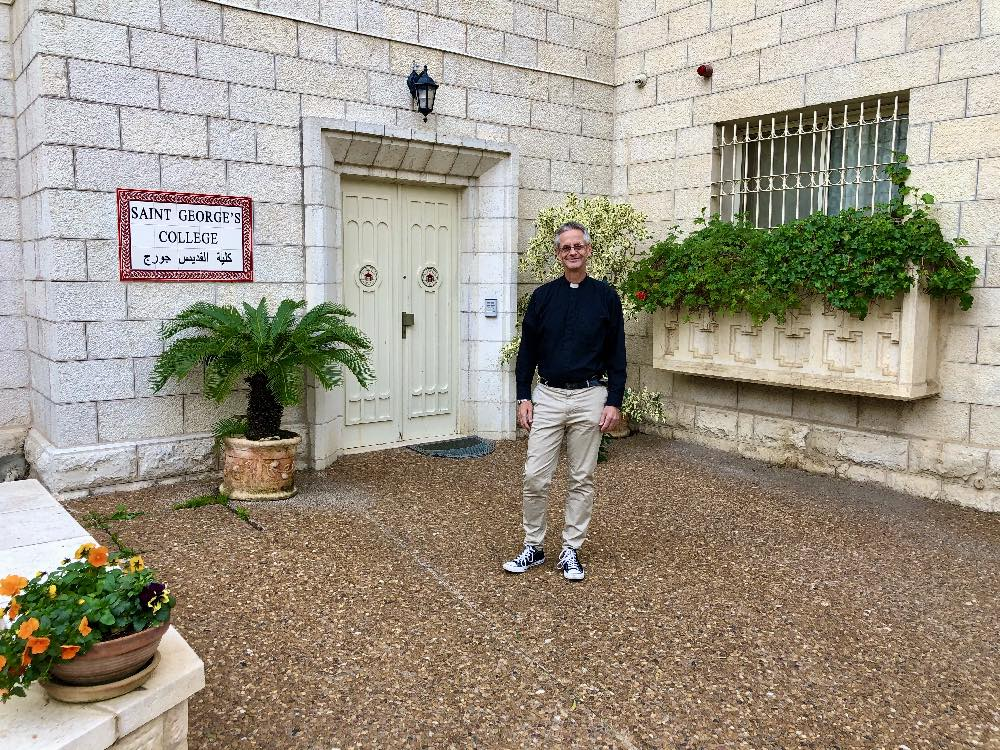Bishop Shane Parker hosted a live webinar on Feb. 1 with Archbishop Hosam Naoum of the Episcopal Diocese of Jerusalem and the Very Rev. Richard Sewell, Dean of St. George’s College Jerusalem. They spoke about the situation in Israel and Palestine and the great need for global support for the Diocese of Jerusalem’s ministries and the small and fragile Christian community in the region.
The webinar was in support of Let Light Shine, the Canadian campaign for St. George’s College, which is the Anglican centre for pilgrimage in the Holy Land. Chaired by the bishop, the campaign aims to raise $250,000 to help the college maintain its operations and support reduced salaries for its staff while the war has stopped all pilgrimages, the primary source of income for the college.

Dean Sewell explained that the college had already depleted its reserve resources when the pandemic stopped pilgrimages. People began to return again in 2022, and 2023 was a very good year until the war between Hamas and Israel ended pilgrimages completely in October of that year.
“Now to have dug deep into our reserves again through these 15 months, we are at that point where we would have to start to think about really extreme measures that I had never wanted to contemplate,” he said. Some staff have had to go to half-time, and thus have 50% of their full-time salary, but a prime concern has been avoiding laying anyone off completely. “We talk about being a family of college staff, and when things get really tough, you can’t simply shed people…. If I have to let any of our staff go, there is virtually nothing else for people to do…. The economy is tanking because of the war…. Our staff are dependent upon us for them to have an income on which to live,” the dean explained.
“So that’s why the Let Light Shine campaign is so important. And I’m very grateful to Bishop Shane for doing a Canadian initiative on top of the US initiative and other parts of the world are also pitching in as best they can. And of course, the need across the board here is immense. The need in Gaza is beyond words and beyond comprehension really and that has gained a lot of support and we’ll need that for many, many years to come.”
Both the archbishop and dean spoke of their hopes and prayers that the ceasefire between Israel and Hamas will hold.
Archbishop Naoum noted that violence in the West Bank continues to ravage communities there.
He also spoke about the endangered Christian presence in the region. “The Christian witness here in the Holy Land has been an important and integral part of the character of Jerusalem and the Holy Land. We cannot imagine the fabric of the Holy Land without the living stones, we call them, … witnessing Christians, who have been witnessing here for two millennia.”
He explained that there about 150,000 Christians within the state of Israel.

All are Arabic-speaking congregations, aside from 30,000 to 40,000 Russian Orthodox Christians. In the West Bank there’s about 60,000 Christians. “In both places, we are talking about less than 2% of the whole population…. In Gaza, before the war, there had been about 1,100 Christians, now there is exactly 650 Christians left, and if the borders would open, the fear is that … we will lose half, if not more, of who is left there because of the situation unfortunately. “
If the ceasefire holds, Archbishop Naoum said work must be done to rebuild trust and relationships between people of all faith groups. Going back far beyond October 2023, he said, “We need to come back to the day where the three religions lived side by side with one another. They fully trusted each other, fully had dignity among each other and mutual respect. I remember in my own village back in the north, … these communities of Jewish, Muslim, Christian, Druze lived together side by side and they celebrated everything within their lives, whether funerals or weddings.”
He added, “We can live together. There is so much to share as long as we respect each other, as long as we can have dignity and also most importantly have freedom and end the occupation of the Palestinian territories in order to pave the way for a just and lasting peace.”
Reconciliation is a focus at St. George’s College and in its pilgrimages. Even before this war erupted, Dean Sewell said, “It’s always been important for the college not simply [to take pilgrims] to visit the holy places but to engage with the diverse peoples of the land and to build bridges of understanding and to deal with the injustices that are at the heart of the suffering, so that people do not go away spiritually lifted by visiting the holy places but ignorant of the realities on the ground.”
Not only do people who come on pilgrimage encounter Christians of many different denominations, “the College has always tried to engage with the religious communities beyond the Christian community,” Sewell said. “For instance, when we go to Bethlehem, we will have lunch in the Aida refugee camp, and a group of Muslim ladies prepare a meal for all of us and talk about their project that cares for children with disabilities within Bethlehem in the refugee camp. That encounter breaks down all sorts of stereotypes of what Muslims are like and how Muslim women are treated within the Muslim community, within Israel-Palestine, and is so helpful to people to open their eyes to different realities.”
Pilgrims also hear talks from different parts of the Jewish community to hear their perspectives, he said. “It works both ways. By inviting people, they feel affirmed, they feel heard, and by our pilgrims listening, they are educated, and their eyes are open to all sorts of things.
“Then once a year we have a difficult, challenging, but hugely fruitful course we call Sharing Perspectives…. Jews, Muslims, and Christians come from around the world, usually America, Canada, and the UK, on a pilgrimage together to visit with one another each other’s holy places and to learn what those holy places mean. And that place of encounter here in a land which comprises Jews, Muslims, Christians, is such a profound experience, that it engages people in vulnerable places and takes them beyond maybe some of their set views. That has an impact both here in our communities, but of course, then when they go back to their home communities, they can testify to what they’ve seen and heard and experienced. And this is an essential part of the college’s ministry. And I think it will be even more so in the new reality when we’re able to reopen,” Sewell said.
Archbishop Naoum said that the diocesans institutions, including the Al Ahli Hospital and “are really beacons of hope in these communities because we offer services and ministry regardless of ethnicity, regardless of religion, regardless of the colour of the skin.” The hospital was the only one operating throughout the 15 months of the war. He said they had to rely on the gifts and the generosity of people around the world, both Muslims and Christians and even beyond. People of good will who have supported that humanitarian work in a place that was devastated by war.
The diocesan schools, he added, offer education that includes “teaching values of accepting the other who is different from me. And this is by itself is a huge contribution to the community that reduces extremism, it reduces fanaticism, and also it paves the way for an open society where everybody is valued.”
Archbishop Naoum added: “The idea is that no matter what, we are determined as a diocese, as people, as clergy, as heads of institutions, we are determined to continue with our ministry, to continue with our witness as disciples of Christ, to make difference in this world.”
A recording of the webinar can be seen on the Anglican Diocese of Ottawa website.
Learn more www.StGeorgesCollegeJerusalemNAC.org/canada
Donate now: www.CanadaHelps.org/en/dn/124044
Related story:


Saint Mary’s Church, Westmeath — Deanery of the Northwest